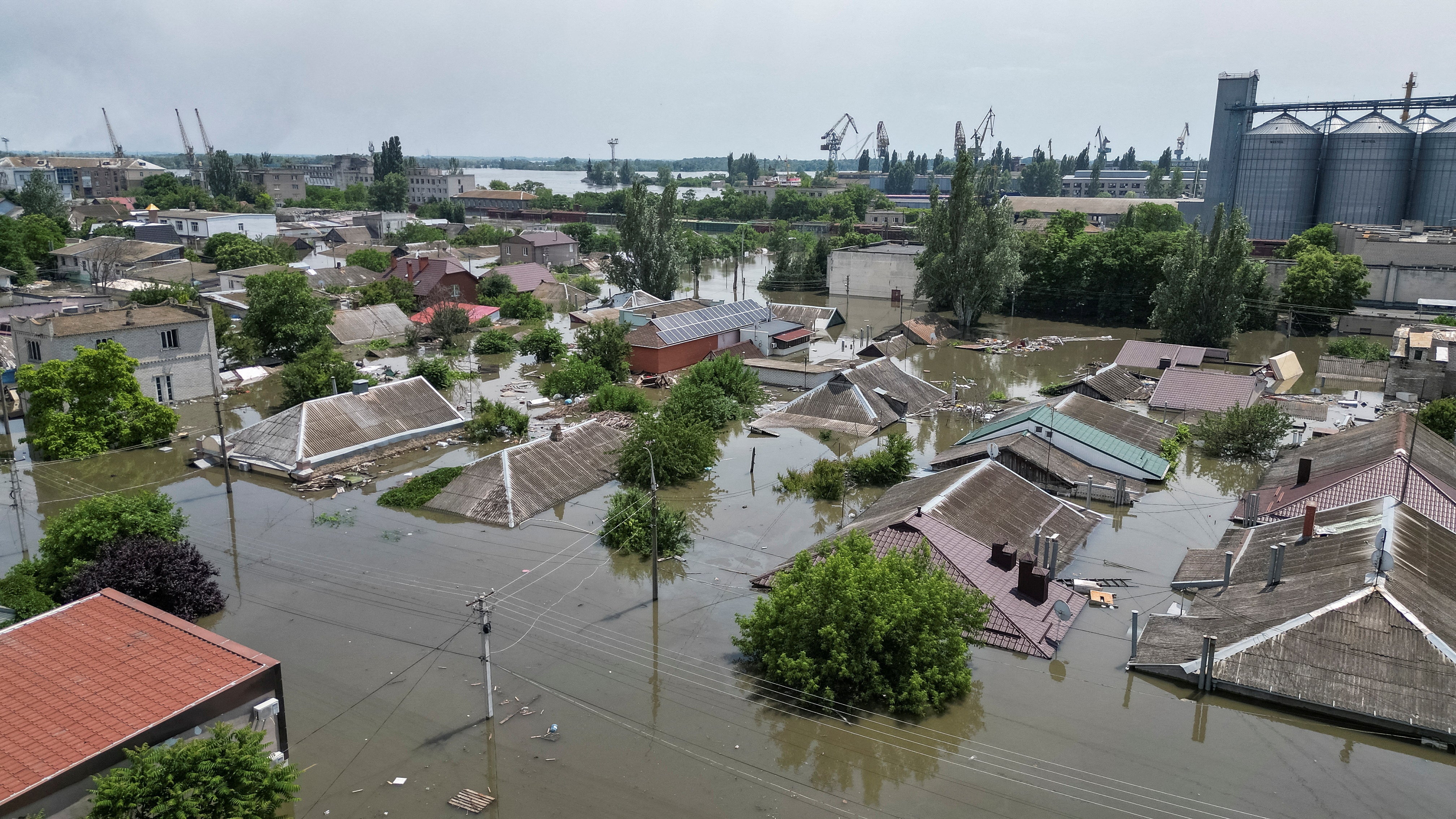The Kakhovka dam attack is a war crime the West cannot let go unpunished
Editorial: Wartime attacks on dams are outlawed by the Geneva Convention if civilians suffer ‘severe losses’. For the sake of the democratic world, we cannot allow such acts of terrorism to pay

During the 16-month conflict in Ukraine, the people in the southern city of Kherson have been invaded by Russia, liberated by Ukraine and must now endure yet another exhausting crisis – flooding after the Nova Kakhovka hydroelectric dam on the Dnipro River was destroyed. Some 80 towns and villages are at risk from rising water levels, and tens of thousands of people will be evacuated.
It is a humanitarian crisis, with hundreds of thousands of people left without drinking water. It might also prove to be the worst ecological disaster since the Chernobyl nuclear plant meltdown in 1986. It could take five years for agriculture to recover in one of Ukraine’s most fertile areas at an estimated cost of £1bn a year.
Despite Russia’s predictable denial of responsibility, most of the free world will assume that this is the latest example of Vladimir Putin’s scorched earth strategy. If winning at any cost includes harming water supplies in Russian-occupied Crimea and floods on the side of the Dinpro that Russia holds, so be it. Rishi Sunak is right to say that, if it is determined that Russia destroyed the dam, it would represent a “new low”. Indeed, it is a huge moment in the conflict.
It is no coincidence the attack came a day after we saw the first evidence of Ukraine’s long-predicted counter-offensive. It will make it harder for Ukraine to mount this operation; the loss of the road across the top of the dam could deprive Kyiv of one potential line of attack. However, there are signs that Ukraine expected such a response. Although its offensive might be slowed, the military impact will hopefully be less significant than Moscow hoped.
The loss of the dam is unlikely to be the last such atrocity, since the counteroffensive is a pivotal phase in the first war on European soil since Second World War. British intelligence suggests the Zaporizhzhia nuclear plant, which relies on water from the river, is unlikely to face immediate safety issues. But there are fears in Kyiv that Russia might be planning to blow it up.
The disaster at Kakhovka will give a sharper edge to the talks on Ukraine between Mr Sunak and Joe Biden at the White House on Thursday. They will doubtless come up with suitably strong language, and warnings that Russia will face a reckoning for its ecocide. They should make clear it will be taken into account when attention turns eventually to the reconstruction of Ukraine and Russian reparations.
The act is surely a war crime because wartime attacks on dams are outlawed by the Geneva Convention if civilians suffer “severe losses.” One possible route is the International Court of Justice (ICJ) in the Hague, which on Tuesday began hearing a case in which Ukraine accuses Russia of being a terrorist state, citing its financing of pro-Russian separatists who shot down Malaysia Airlines flight MH17 in 2014. The ICJ, a civil tribunal handling disputes between United Nations members, does not prosecute individuals like the better-known International Criminal Court, which Russia does not recognise.
However, the grim reality is that this latest atrocity highlights the impotence of the West in a conflict in which Ukraine’s Volodymyr Zelensky understandably feels he is fighting with one hand tied behind his back because his allies are slow to provide him with the military tools his forces desperately need.
The UK can hold its head high on this front, as Boris Johnson and Mr Sunak have been in the vanguard of helping Ukraine. But the worrying backcloth to Mr Sunak’s visit to Washington is a debate about how long the West can carry on backing a war of attrition which Ukraine might be unable to win. Influential Republican voices are raising the prospect of a ceasefire later this year.
This is dangerous, defeatist talk that will only give succour to President Putin, who would see negotiations as a route to locking in Russia’s illegal territorial gains, and would have high hopes of the West’s unity crumbling after a ceasefire.
The lesson of Kakhovka is that the West must not waver in its support for Ukraine or allow such acts of terrorism to pay. For the sake of the democratic world, it must match President Putin’s “whatever it takes” mentality with a similar resolve.



Join our commenting forum
Join thought-provoking conversations, follow other Independent readers and see their replies
Comments